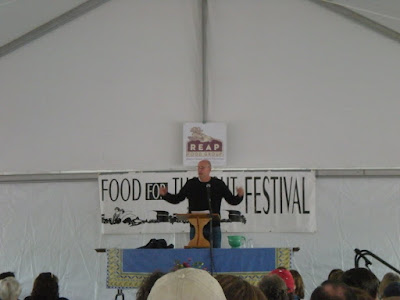Thoughts from Darcy, the vegetarian in the house
I've been a vegetarian for a decade as of May. I am committed. I don't worry that I'll ever be tempted to return to the Dark Side. I eat better now than I did when I was a meat-eater. I take in more protein because I am conscious about it. I feel lighter, fresher, happier. I love knowing that my dedication to more compassionate eating saves approximately 60 animals per year. I hold no judgements about my fellow meat-eating friends, but I am happy with my choice and intend to advocate for more thoughtful eating (on many levels, not just animal-based ones) until I am out of breath.
My husband knows this to be true; he participates in my rants about factory farming, sends me articles concerning rescues, abuses, and all things related, and he questions food choices all the time. But he can't make the no-meat commitment. He's an omnivore. A compassionate omnivore, but a meat-consuming man nonetheless.
Everyone always assumes that I am married to a vegetarian. When I reply that I'm not, people usually say, "Really? Does that bother you?" ...and I have to say that before meeting Andy, I had idealized meeting some animal-rights advocating, environment-saving, continent-hopping vegan who I'd be inspired to emulate, realizing that my commitment to vegetarianism wasn't enough. The matters of the heart don't always turn out the way we plan (of course), and I met and married a compassionate ... meat-eater!!! (SHRIEK!! GASP!!)
But, he's taught me quite a bit. Meat-eaters can be thoughtful and considerate of the animal whom they're about to consume (CRAZY, I know!). Andy shops around. He doesn't eat at McDonald's (and no offense to those of you who do). He doesn't buy his meat at the chain grocery store down the road. He chooses his meat based on what the animal is allowed and given to eat. He thinks about how far from the farm the slaughterhouse is (because after all, those trucks are packed, moving fast, and scary). He investigates the farms on which the animals are raised, and if possible, drives by and/or visits. And he buys locally and from farmers he's talked with at the farmer's market, at the co-op, or through our CSA.When we have potlucks or go to them, he always volunteers to bring the meat to ensure what he and everyone around him is eating is something he wouldn't be embarrassed to present to Michael Pollen or Barbara Kingsolver.
We also are friends with many who hunt without all of the artificial baits. For me, this seems like a much more ethical, compassionate choice from which to obtain meat than the daily decisions many of us make. While most humans can't imagine shooting a deer, most also have no qualms about eating a steak from the grocery store - a steak that comes from a cow who was fed grain its entire life (not natural), who traveled, possibly across multiple state lines to get to a slaughterhouse, and who never was allowed to frolic or play in its surroundings. I think the venison sounds a bit more up my alley. In fact, had I married a hunter, I might be eating a different diet right now. Who knows?
Ethical eating is a complicated thing. Food involves memories, tastes, textures, beliefs, culture, and family. One's choices offend someone, while to someone else those choices deserve applause. The best we can do is all work for kinder systems and cultural norms. Ones that harm the environment less. Ones that harm living things less. Of course, for many of my veggie readers, you might be thinking: Eating small-scale farm meat is not enough.Hunting is still killing., etc., etc. I understand, but I feel those are a beginning. And compromises. I tend to think we veggies are not going to convert everyone, so we have to advocate for and support kinder, more compassionate farms, transport systems, and slaughterhouses, and we have to applaud those who venture into the woods to obtain their meat for their families naturally.
And, back to living with a (screech!) Meat-Eater!!!....People wonder what happens with The Meat in our house. The gross factor. The thick slab of flesh on the counter or the bloody one dethawing on a white plate in the fridge surrounded by smelly, red blood. Many of my vegetarian friends ask me, ""Really? You're married to a meat-eater? But how do you cook? Doesn't his meat gross you out?"
To that, I say...take a look at what we cooked tonight. We grilled. He had a burger (from Grazers, aka Harmony Valley Farm; Viroqua, WI) with grilled veggies, and I had grilled scallions and asparagus over arugula. I love these meals! So simple. So delicious. So us. ...and as long as I don't have to actually touch the meat - no gross factor.
If you're looking for small-scale farms that sell Andy-approved meat, here are a few in Wisconsin. In and around Madison, these can be found at local farmers' markets, the Yahara River Grocery Co-op in Stoughton, either Willy Street Co-op, and Whole Foods. Some also accept online orders, and you can always make a road trip and visit the place directly to get your meat.
- Trautman Farms - Stoughton, WI
- Black Earth Meat (Cates Family Farm) - Spring Green, WI
- Willow Creek Pork - Baraboo Hills, WI
- Fountain Prairie Farms - Fall River, WI (as far as we know, only available at the Farmer's Market or special order)
- Jordandal Farms - Argyle, WI
- Catnip Hollow Bison (and the owner, Mark Koeppl) has helped MANY of our pets live and/or die peacefully) - Mt. Horeb, WI
















